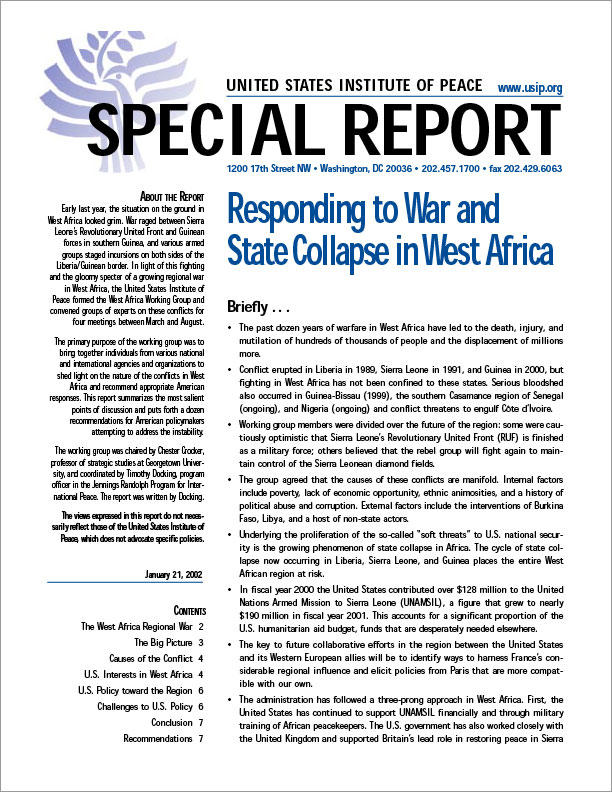
Summary
- The past dozen years of warfare in West Africa have led to the death, injury, and mutilation of hundreds of thousands of people and the displacement of millions more.
- Conflict erupted in Liberia in 1989, Sierra Leone in 1991, and Guinea in 2000, but fighting in West Africa has not been confined to these states. Serious bloodshed also occurred in Guinea-Bissau (1999), the southern Casamance region of Senegal (ongoing), and Nigeria (ongoing) and conflict threatens to engulf Cote d'Ivoire.
- Working group members were divided over the future of the region: some were cautiously optimistic that Sierra Leone's Revolutionary United Front (RUF) is finished as a military force; others believed that the rebel group will fight again to maintain control of the Sierra Leonean diamond fields.
- The group agreed that the causes of these conflicts are manifold. Internal factors include poverty, lack of economic opportunity, ethnic animosities, and a history of political abuse and corruption. External factors include the interventions of Burkina Faso, Libya, and a host of non-state actors.
- Underlying the proliferation of the so-called "soft threats" to U.S. national security is the growing phenomenon of state collapse in Africa. The cycle of state collapse now occurring in Liberia, Sierra Leone, and Guinea places the entire West African region at risk.
- In fiscal year 2000 the United States contributed over $128 million to the United Nations Armed Mission to Sierra Leone (UNAMSIL), a figure that grew to nearly $190 million in fiscal year 2001. This accounts for a significant proportion of the U.S. humanitarian aid budget, funds that are desperately needed elsewhere.
- United States and its Western European allies will be to identify ways to harness France's considerable regional influence and elicit policies from Paris that are more compatible with our own.
- The administration has followed a three-prong approach in West Africa. First, the United States has continued to support UNAMSIL financially and through military training of African peacekeepers. The U.S. government has also worked closely with the United Kingdom and supported Britain's lead role in restoring peace in Sierra Leone. Finally, the United States continues its military and financial support to the Conté government in Guinea. The main aim of the administration's policy is to increase regional stability while bringing about regime change in Liberia.
- UNAMSIL must be seen for what it is: a quick-fix, capacity-building effort that is not sustainable over the long run. Unless the profound socio-economic problems that grip the entire region are addressed, West Africa will remain fertile ground for future violent conflict.
About the Report
Early last year, the situation on the ground in West Africa looked grim. War raged between Sierra Leone's Revolutionary United Front and Guinean forces in southern Guinea, and various armed groups staged incursions on both sides of the Liberia/Guinean border. In light of this fighting and the gloomy specter of a growing regional war in West Africa, the United States Institute of Peace formed the West Africa Working Group and convened groups of experts on these conflicts for four meetings between March and August.
The primary purpose of the working group was to bring together individuals from various national and international agencies and organizations to shed light on the nature of the conflicts in West Africa and recommend appropriate American responses. This report summarizes the most salient points of discussion and puts forth a dozen recommendations for American policymakers attempting to address the instability.
The working group was chaired by Chester Crocker, professor of strategic studies at Georgetown University, and coordinated by Timothy Docking, program officer in the Jennings Randolph Program for for International Peace. The report was written by Docking.
The views expressed in this report do not necessarily reflect those of the United States Institute of Peace, which does not advocate specific policies.